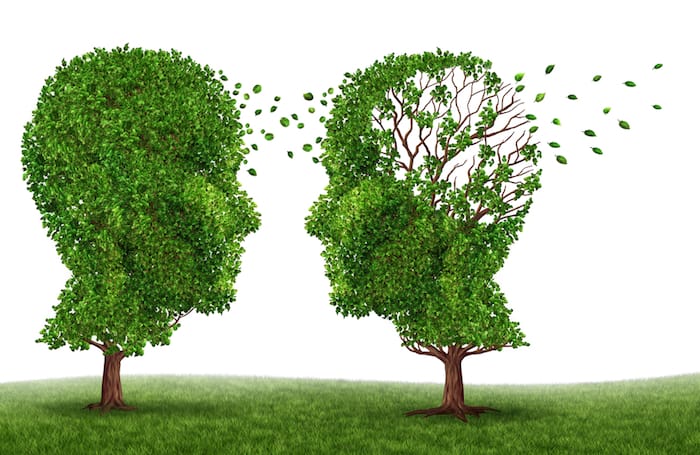Do you want to improve your memory? Of course you do. Who wouldn’t? Memory loss is often associated with aging. According to the National Institute on Aging (NIA), it is normal that it might take longer for you to remember things as you age.
Typical memory changes among healthy people include:
- Difficulty focusing on more than one thing at a time
- Increased energy and effort to learn new things
- More time needed to recall information
Some memory problems are more serious than just forgetting someone’s name or where you put your car keys. Memory loss disorders include dementia and Alzheimer’s disease. Although there is no cure, there are steps you can take to preserve and enhance your normal brain function, improve your memory recall, and slow the progression of memory loss and other age-related cognitive disorders.
People pay attention to other organs of the body, like the heart, but tend to forget that your brain is an organ too. You need to take as much care of your cognitive abilities as you would with your heart.
To prevent heart disease or diabetes, you try to reduce your blood pressure, lower your body weight and cholesterol, eat a low-fat diet and exercise.
We encourage everyone to follow this same regimen for your brain. But we also want you to exercise your mind. You can remain mentally sharp if you practice and work at it.
Here are five ways to improve your memory and reduce your risk of dementia or Alzheimer’s:
Get plenty of sleep
Sleep is one of the best ways to preserve and boost memory recall. Getting enough sleep is one of the simplest ways you can protect your memory as you age. Sleep deprivation can actually impair all aspects of your memory. According to the Sleep Foundation and other peer-reviewed studies, sleep and memory share a complex relationship. What are the effects of sleep? A good night’s sleep is associated with improved mental wellbeing. Alternatively, lack of sleep can impact your ability to perform basic activities of daily living and also increase the risk for Alzheimer’s disease or other brain health issues down the line.
Getting enough hours of sleep and rest helps you process new information once you wake up, and sleeping after learning can consolidate this information into memories, allowing you to store them in your brain.
Most people need about 7-to-9 hours of sleep per night. It’s important to achieve this recommended sleeping amount so you don’t suffer from sleep deprivation.
Stay mentally active
As we get older, it is natural to start noticing changes in our brain’s ability to remember things, learn new things and focus. But this doesn’t mean that we are doomed to a life of frustration and forgetfulness. All brain activity, including brain activity in the absence of external stimuli, creates pathways, or connections, in the brain. The more you do, the more your brain develops. It doesn’t matter what you are doing, as long as you are doing something. However, some activities are better than others for certain aspects of brain function. While a brain game may help you focus, learning a new language may help improve memory retention. The best strategy is to try a variety of brain-boosting activities.
Cells die all the time in your brain, but they regenerate new cells. With memory loss, the cells don’t regenerate as quickly. Keeping the brain active increases its vitality and helps generate new brain cells.
Studies show that the risk of dementia is lower if your level of education is high school or better, Dr. Factora says. But you can keep learning throughout your life, no matter how far you got in school.
Studies by researchers have also shown that if you can maintain an 8th-grade level of reading or literacy throughout your life, it will help keep your mind active, You can also engage in hobbies that help keep you learning or challenged.
Your mental health and wellbeing impact your overall happiness, the quality of your relationships and your ability to manage your emotions.
The Alzheimer’s Association offers these tips to keep your brain active and improve your memory recall on a daily basis:
- Stay curious and involved — commit to lifelong learning
- Read, write, work crossword or other puzzles
- Attend lectures and plays
- Enroll in courses at your local adult education center, community college or other community groups
- Play games
- Garden
- Try memory exercises
- De-stress. Methods to relieve stress are extremely beneficial to brain health, which is why meditation is widely acclaimed as an effective way to promote calm and reduce stress.
Remain socially involved
There are many benefits to remaining socially engaged as you age. According to the Alzheimer’s Association, research shows that people who are social and interact with others maintain their brain vitality. Stay socially engaged in activities that stimulate your mind and body.
Build your self-esteem by engaging in new hobbies or activities that you find interesting. Have fun while learning a new skill or process, educating yourself on a new subject or creating something unique.
The best way to remember something is to remember the time, place, and emotion that goes with it. Unfortunately, we live in a hectic, fast-paced world, and life can get in the way. However, this doesn’t mean you should avoid social situations, or stop keeping up with friends and family. By remembering the above tips, you can become as socially involved as you want to be, and remember everything you need to, as well.
Stay physically active
Physical exercise may not sound like much of a cure-all, but when it comes to boosting brainpower, it’s true that you are what you do. In fact, recent research suggests that regular exercise not only improves your memory but might also help you grow new brain cells in areas related to memory and learning. One study found that after 12 weeks of aerobic exercise, sedentary adults who were in their 60s showed significant improvements in memory, reasoning, and planning.
Regular exercise is essential for maintaining good blood flow to the brain and can encourage new brain cells. It can keep you mentally sharp by increasing blood flow and oxygen to the brain.
Studies show that there is a connection between the risk factors of cardiovascular diseases and Alzheimer’s. By exercising, this is one of the things you can do to reduce risk of heart disease, stroke, diabetes and even Alzheimer’s.
Aerobic exercise improves oxygen consumption, which benefits brain function. The “Maintain Your Brain” program advises walking, bicycling, gardening, tai chi, yoga and other activities of about 30 minutes daily to get the body moving and the heart pumping.
Adopt a brain-healthy diet
The brain thrives on a healthy diet—and that begins with what you put into your body. A healthy diet is one that is rich in vitamins, minerals, and antioxidants. These nutrients help maintain a healthy brain function and are key to improving memory.
A diet full of fruits, vegetables, whole grains, and healthy fats may not only help you lose weight, but also help improve your memory. According to a study by researchers at Rush University Medical Center in Chicago, the Mediterranean diet may help prevent memory loss and other mental decline associated with aging. The findings, published in the May 2012 issue of Alzheimer Disease and Associated Disorders, suggest that even moderate adherence to this brain-healthy diet can significantly reduce a person’s risk for Alzheimer’s disease.
Like the heart, the human brain needs the right balance of nutrients, including protein and sugar, to function properly. Manage your body weight for overall good health of brain and body. Reduce your intake of foods high in fat and cholesterol. Studies have shown that high intake of saturated fat and cholesterol clogs the arteries and is associated with higher risk for Alzheimer’s disease. Also, try baking or grilling food instead of frying.
The choices we make in our lifestyle can profoundly impact our overall brain health and our memories. There is no 100% guarantee that you will prevent memory loss, but by following some of the tips above, you can keep your mind functioning at peak levels.
Finally, get help when needed. If you have tried to improve your mental health but are still experiencing negative feelings, it may be helpful to seek advice from a knowledgeable, caring professional.
For more information on “Maintain Your Brain,” visit www.alz.org.









1 thought on “5 Simple Ways That You Can Improve Your Memory”
Comments are closed.